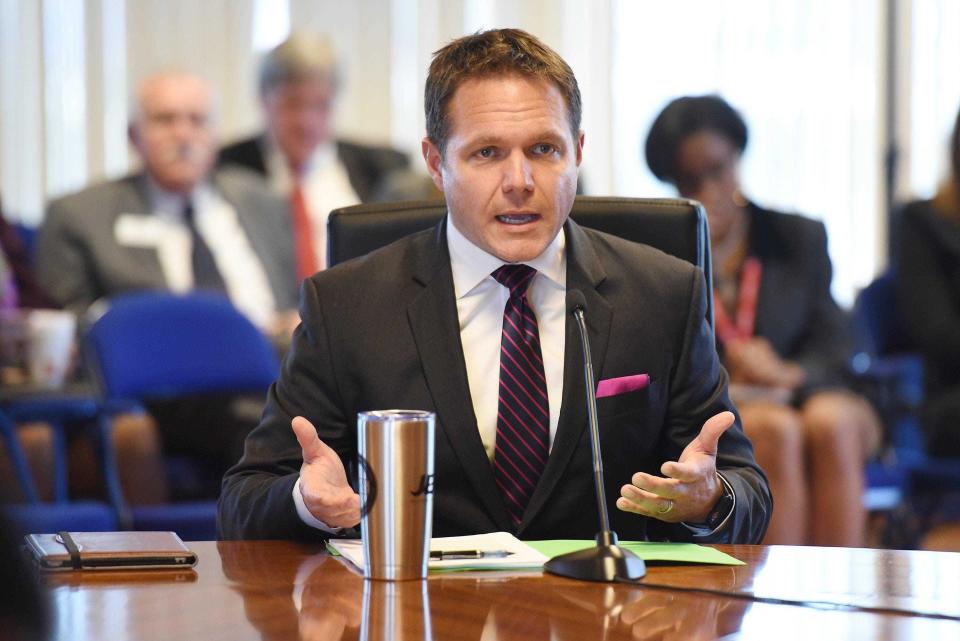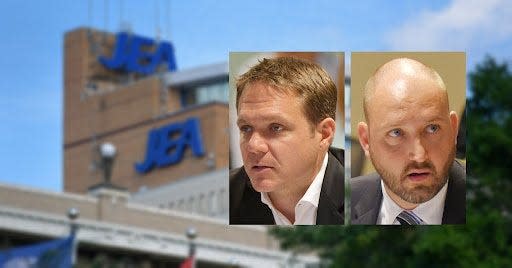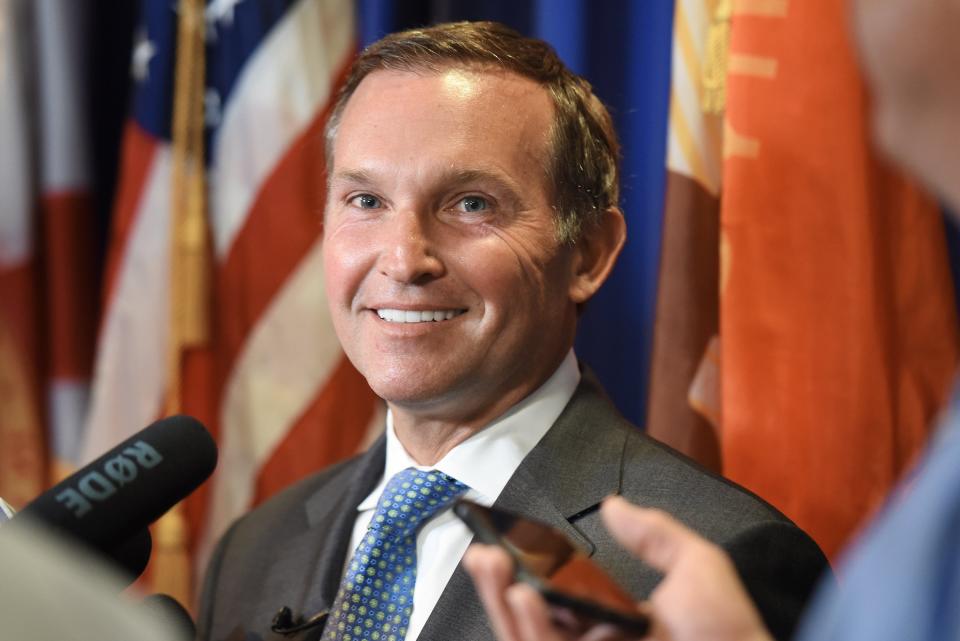Federal grand jury indicts former JEA executives on conspiracy, wire fraud
Federal prosecutors on Monday unsealed a grand jury indictment charging former JEA chief executive officer Aaron Zahn and finance chief Ryan Wannemacher with conspiracy and wire fraud, casting the two men as the architects of a brazen scheme to secretly extract tens of millions of dollars of personal profit out of the city-owned utility before selling it off to a private operator.
The 30-page indictment accuses the agency’s former top executives of devising a plot to enrich themselves by disguising it as a good-faith exploration of JEA’s financial future, burying their plan beneath layers of legitimate work product provided by consultants as well as opaque — and fraudulent — financial forecasting generated by Zahn and his team.
In truth, prosecutors allege, almost every aspect of the failed effort to privatize one of Jacksonville’s largest and most important public agencies – a policy project Mayor Lenny Curry threw the weight of his administration into supporting – was a fraud, echoing the past findings of auditors, outside attorneys, a Jacksonville City Council investigation and previous Times-Union reporting.
30-page indictment: You can read it all here
Money & Power: The secret origins — and public collapse — of the campaign to privatize Jacksonville’s electricity and water
More: Fired JEA CEO Aaron Zahn knew bonus plan could yield $280 million before it was approved

The Times-Union left messages for an attorney representing Zahn but did not receive a response.
Jim Felman, an attorney representing Wannemacher. declined comment "at this time."
Curry said of the indictments, "My administration has, and will continue, to cooperate with all official inquiries into the management of our local utility. Beyond that, I will reserve further comment at this time out of respect for the ongoing legal process."
The criminal charges against Zahn and Wannemacher are the culmination of a prolonged federal investigation – spanning two presidential administrations, the terms of three U.S. attorneys, and a crippling pandemic – examining a controversy a former city general counsel said amounted to “perhaps the greatest fraud in Jacksonville history.”
If nothing else, Zahn's tenure was among the rockiest chapters in the history of JEA, which has served in some form as the city's public utility since the 1880s.
Although Zahn and Wannemacher are the only former utility executives charged with crimes, the indictment references "Person A" — JEA's former chief operations officer, who was Melissa Dykes — and "Person B," the former chief administrative officer, who was Herschel T. Vinyard.
The indictment describes them as playing roles helping Zahn craft bleak financial scenarios that were designed to manipulate the utility's board of directors into believing privatization was the only feasible option going forward — the lynchpin to unlocking the multi-million dollar payouts possible under his secretly devised bonus plan. But it doesn't allege any specific wrongdoing on the part of Dykes or Vinyard.
The case is led by veteran public-corruption prosecutor A. Tysen Duva, who is leading the re-trial of ex-U.S. Rep. Corrine Brown on fraud and tax crimes (she was convicted at trial in 2017 but it was later reversed). Duva also handled the successful fraud prosecution of former Jacksonville City Council members Katrina Brown and Reggie Brown.
The conspiracy and wire fraud charges carry a maximum penalty exceeding 20 years, but federal judges have broad leeway and only rarely hand down the lengthiest sentences.
Zahn and Wannemacher will be arraigned in federal court Tuesday.

Scope of fraud allegations
This latest public corruption case is unlikely to mollify the fiercest critics of Zahn's JEA tenure, who alleged the conspiracy truly started with the mayor, Curry — Zahn's highest-profile backer during much of his time at the utility. Neither Curry nor his administration are mentioned in the indictment, which focuses on a narrow case against Zahn and his former finance chief centered around the bonus plan.
But the scope of the fraud the indictment describes unquestionably stains a controversial campaign to privatize JEA that Curry himself eventually — and unsuccessfully — stepped in to resurrect when it was floundering amid public controversy in late 2019.
Aaron Zahn: What we know about the former JEA CEO
Ryan Wannemacher: What we know about the former JEA CFO
During that effort, Curry lashed out at critics, including former Jacksonville Mayor Jake Godbold and Times-Union journalists, blaming the turmoil on “an unprecedented negative onslaught from a small segment of the media.”
Neither privatization nor the bonus plan ever became reality. They collapsed in late 2019 beneath the weight of massive public outcry: Privatization, long a hot topic in City Hall, was immensely unpopular within JEA's workforce and among the general public; city attorneys told JEA executives to shut down the bonus plan, but the board didn't formally rescind it until the lucrative nature of the scheme had become public in late 2019.
Some city and outside lawyers have long believed it was problematic the bonus plan came as close to implementation as it did, having accused JEA executives of lying to the board of directors to gain legal authorization to finalize it.
Zahn has previously argued he and his team were still working on key aspects of the plan, but the indictment alleges the resolution the board voted on was deliberately written to "require no further consideration by the JEA board."
The federal case, in sum: Zahn had a fiduciary duty to disclose the potential for massive payouts to himself and his executive team were JEA sold to a buyer; not only did he fail to do that, the indictment alleges Zahn and Wannemacher took active, elaborate steps to mislead attorneys, auditors and the public away from that very finding.
Zahn was a visible leader
Zahn was widely viewed as Curry's favored candidate to become JEA's permanent CEO during the board search in 2018. And, having never led a utility of any size before the board tapped him to become JEA's leader — a lack of experience the indictment noted — Zahn had little else to speak for his candidacy except the mayor's backing. Prior to his time at JEA, Zahn, the former head of a small waste-water technology firm, was a mostly obscure figure in Jacksonville political circles.

His tenure at JEA permanently changed that, likely in ways he did not expect.
By design, Zahn made himself one of the most visible public officials in Jacksonville. He had JEA shell out hundreds of thousands of dollars to host a multi-day conference focused on infrastructure innovation where Zahn himself — tie-less and wearing a wireless mic — was a key speaker.
He worked hard to win over executives in JEA tower's upper floors, who were suspicious of his sudden rise, and he embarked on a campaign to win over the utility's rank-and-file workforce with gimmicks and a traveling road show of sorts.
But Zahn was never able to shed the perception his only interest in JEA was to sell it, an image the indictment will do little to alter. Zahn, prosecutors allege, had begun to work on privatizing JEA in 2018, "before he was named permanent CEO of JEA."
Taken at face value, Zahn, who fashioned himself an innovator and "disruptor," laid out a business philosophy that emphasized the looming threat of technological innovation; for JEA, this meant the expanding popularity of rooftop solar technology — allowing some customers to generate their own electricity and largely leave JEA's grid.
Zahn believed this trend, combined with other factors, would create what one JEA board member called a "death spiral" — a permanent and precipitous decline in electric revenues despite an influx of new residents, leaving customers still reliant on the grid paying ever-larger bills. In essence, he would tell employees, he didn't want JEA to become the next Blockbuster, the iconic video-rental chain that disappeared virtually overnight with the advent of Nextflix and its larger failure to adapt to the changing industry.
This theory about JEA's future was highly speculative and one that many agency employees, officials in the public power industry, Wall Street analysts and even some of JEA's would-be buyers didn't agree with. It also contradicted years of JEA's own statements about its financial future, some of which it repeated for credit-rating agencies and regulators even as Zahn told his board and the public a different story.
But little of that dissent made its way into JEA board presentations, where Zahn's scenario was treated as a near-certainty.
Prosecutors allege it was all a sham.
JEA privatization a false choice
The criminal case hinges on two different but related alleged efforts by Zahn and Wannemacher to manipulate the board of directors and the public during an eventful meeting on July 23, 2019.
Selling JEA to the highest bidder was the key to unlocking the multi-million dollar bonus payouts they wanted, so it wasn't just necessary to conceal the nature of that bonus scheme, prosecutors allege. The executives also needed to make privatization appear to be the most attractive — and perhaps only — responsible option for the board of directors to choose. So they were given a false choice.
The indictment directly references the "death spiral" scenario, alleging it "falsely and fraudulently" projected JEA's decline if privatization were not pursued. It called for dramatically reduced expenses and for the board to layoff nearly 30 percent of JEA's workforce. That scenario was specifically crafted to convince the board privatization "was necessary to avoid JEA's certain demise," according to the indictment.
In fact, the indictment alleges, privatization was the only serious option JEA's leaders were considering.
Zahn, according to the indictment, had already met with the CEO of one potential bidder in West Palm Beach just days before and disclosed the utility was considering privatization. At the time, Zahn had repeatedly denied that he was a mayoral plant to sell JEA. The meeting has never been previously reported. It's not clear which company the indictment is referencing.
At the same time, Zahn and Wannemacher worked on two versions of the bonus scheme.
One version — the version provided to the board of directors and the public — described a modest compensation program costing only about $3 million aimed at boosting employee morale. One board member — who is referred to only by initials "A.A." in the indictment — said Zahn had told him directly the cost of the plan was estimated to be about $3.4 million. The only JEA board member with those initials at the time was developer Andy Allen, who was new to the board at the time.
The second version — the secret, true version, according to the indictment — could have generated a pool of bonus money totaling $1 billion or more, almost all of which was intended to benefit the agency’s top executives. Privatization was the key event that would trigger massive payouts, making the public agency’s top employees multi-millionaires in one fell swoop.
Neither Zahn nor Wannemacher disclosed this to the board of directors, prosecutors allege.
That scheme was allegedly propped up by both sophisticated and more blatant lies: They are accused of going as far as altering the draft of a PowerPoint presentation prepared by an outside consultant, which bore the company's logo, to make it appear as if that consultant had approved a version of the bonus plan. In reality, the idea belonged to Zahn and Wannemacher, according to the indictment.
Perhaps among the most critical pieces of evidence in the case are a series of spreadsheets discovered by federal agents where it appears Wannemacher had calculated just how turbo-charged the bonus payouts would be in the event of a sale.
The plan operated like a bit like a stock-purchase plan, with phantom "units" available for purchase by employees. The indictment alleges the vast majority would have only been available for purchase by the highest-level executives. The value of those units would go up or down based on JEA meeting certain financial metrics; privatization would have juiced the formula to produce payments in the hundreds of millions if not more.
In one spreadsheet, Wannemacher allegedly calculated that privatization could make the value of just a single unit rise from $0 to $11,500.
Executives had planned on issuing at least 30,000 units.
'Coming to a close'
Two City Council members who were heavily involved in the council’s JEA Matters Special Investigative Committee said the indictments tracked the findings of the committee’s months-long probe that hired Jacksonville attorney Steve Busey to compile a detailed report on the sales process.
“It sounds exactly like what I shared with Steve early on that we’re going to find out that under the guise of legitimate work of JEA, there was an entirely fraudulent operation going on,” said council member Brenda Priestly Jackson, who was chairwoman of the committee.
She said she thinks the indictment highlights “the level of corruption at the root” of the sales attempt.
“I’m grateful because sometimes I don’t think folks understood the enormity of all of that,” she said.
Council member Rory Diamond, who served as chairman of the investigative committee when it initially kicked off, said there were “some good reasons to at least consider the sale of JEA” but Zahn’s efforts “were clearly to enrich himself and not necessarily to help the people of Jacksonville, in my opinion.”
“I’m excited that this long history and chapter for Jacksonville is coming to a close,” Diamond said. “What’s alleged in the indictment lines up exactly with what our investigatory committee found which was an attempt to steal hundreds of millions of dollars from the people of Jacksonville.”
This article originally appeared on Florida Times-Union: Former JEA executives indicted on charges in public utility scandal

